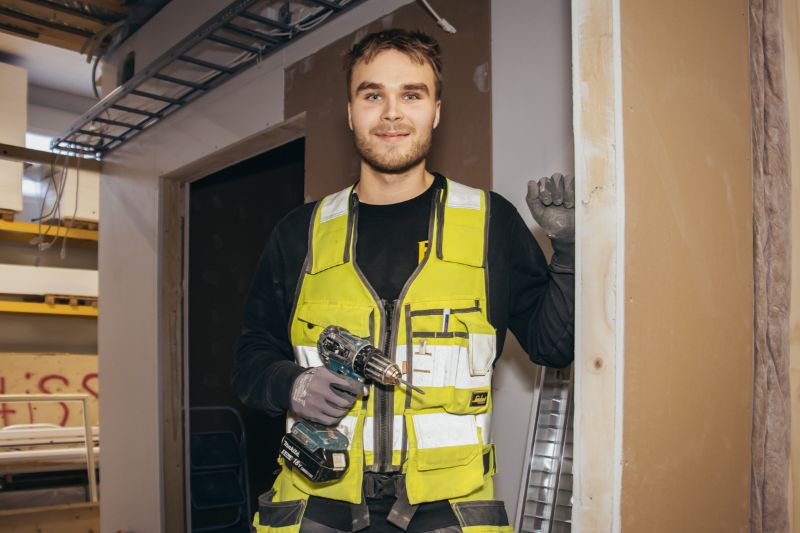Carpenter
"The work requires manual dexterity and the ability to solve problems. For example, in old houses, the dimensions do not usually correspond to what is stated in the floor plan. One must also be able to withstand pressure, as the work must be carried out quickly, but you must not be careless."

- Peetu Jokipolvi
- Carpenter and entrepreneur at PjE Works Oy.
- Has completed a vocational qualification in construction, at Tampere Vocational College.
- Five years of work experience in the field.
Briefly explain what you do for a living.
I work in the construction industry in our two-man company. We renovate kitchens, bathrooms and saunas in old houses or, if necessary, we renovate the entire house.
How have you ended up in the profession of your choice?
The construction industry is familiar to me through my father's work. As a young boy, I followed him to construction sites, where I helped carry things. That is why the carpenter profession was a natural choice for me.
Describe your typical working day or week.
The tasks of the day vary depending on the site where we work. At the moment, we are working on a larger project to repair barracks that serve as temporary facilities. In the evenings, I tend to read e-mails and respond to invitations to tender.
What kind of work environment or working hours do you have?
Usually I work at customers' homes. Sometimes it may be cold at work sites, if the doors have been dismantled. I usually come to work between 8 a.m. and 9 a.m. and stop working between 4 p.m. and 6 p.m. Working hours are affected by the location of the site. If I repair a cottage in the forest, the noise of the renovation usually doesn’t bother anyone. In an apartment block, it is necessary to plan in more detail when to do the work phases that cause noise. I am an entrepreneur, so I respond to e-mails in the evenings and go through invitations to tender.
What kind of competence or qualities are required in the profession?
The work requires manual dexterity and the ability to solve problems. For example, in old houses, the dimensions do not usually correspond to what is stated in the floor plan. One must also be able to withstand pressure, as the work must be carried out quickly, but you must not be careless.
What is the best thing about your profession?
I like that I get to meet a lot of new people in my work and I always learn new things. With work experience, the ability to solve problems develops. The best thing about being an entrepreneur is the freedom and the fact that I can define my own schedules. I can go cycling or paragliding in the middle of the day if the wind is good.
What are the downsides of the profession or what seems challenging?
The work is physical and is carried out in difficult positions. For example, work tasks where you look up and reach upwards a lot can be straining. It's important to remember to eat and drink well. Also, sports and stretching support my well-being.
What would you tell a person considering the profession of a carpenter?
I recommend the profession of a carpenter because it allows you to work with your hands. I also like working with a partner. If you do not want to do manual labour at a construction site, you can study to become a master builder, for example.
How do you see the future of your profession?
Cities are growing, and people are always building more. I believe that there will be plenty of work and robots will not replace people in construction work for a long time. Working methods and materials change, and it is the task of us as the professionals to keep up with the change.
Photo: Katja Lehtinen
